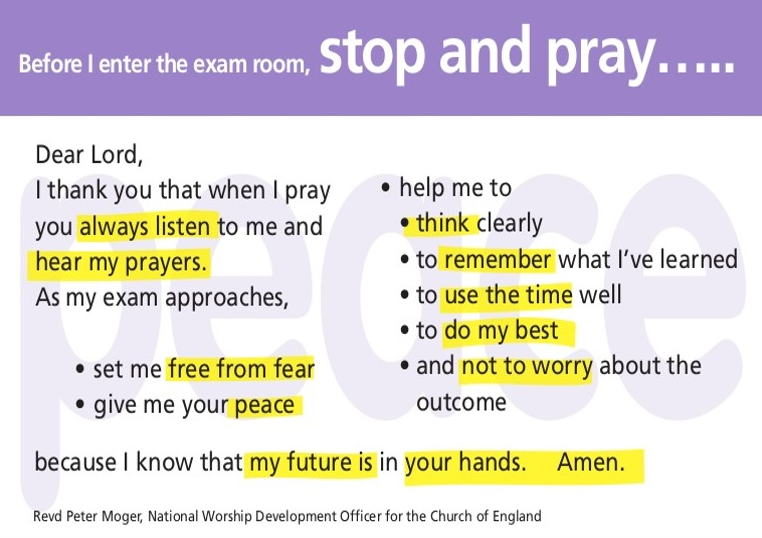The weather’s lovely, hayfever has kicked in, the teens have cleaned out their blazer pockets and sharpened their pencils. It must be exam time.
How can we help ease the pressure and stress? We all have different ‘subjects’ to study. Your specialist subject might be your son or daughter. It might be your grandchild. Maybe it’s the girl you’ve been mentoring at church. It could be your nephew or niece. Whichever tricky teen we’re in a position to help through their exams, let’s see if we can get an A* for helping (or is that a Grade 1?). There’s probably nothing new here – you’re more of an expert motivator than you think. But if you need to boost your confidence, swot up with these revision notes. I hope a few of these ideas help tonight.

Caring for those taking exams: Revision notes
1. Pray with them
If it’s not part of your normal life, it’s a great time to start. When we’re upset or anxious, we’ll pretty open to anything that might help. You may have found that offering to pray with (or at least, for) someone is rarely refused. Our kids are the same. Even if they act like they don’t want you to pray, do it anyway. If it’s too hard, print out a prayer and leave it on the bathroom wall.
 2. Act like an idiot so they don’t feel like the only one
2. Act like an idiot so they don’t feel like the only one
My kids love to hear stories about my disasters, embarrassments, and failures! If you tell them about silly things you’ve done and what the consequences were, it will relax them and might help them to share their concerns or mistakes. I’ve already told my 12-year old about failing my A-Level history mock because I didn’t understand the keyword in the essay title (it was ‘prerogative’, by the way!)
Get them to tell you what kind of questions come up on the exam they’re preparing for. Simply talking through the types of command words (describe/discuss/evaluate, etc.) that come up in different subjects will help kids to spot them. See whether Alexa knows what they mean. That’s always good for a laugh – she’s struggling in my house at the moment!
 3. Be nice, be patient
3. Be nice, be patient
Take some time to look after yourself each day, so you have more patience. There are so many times you’ll want to tear your hair out because they’re not revising, they’re being hard work, they’re grumpy and self-centered. It’s the same for any time of family stress – it’s so easy to take our bad day out on those around us and you’ll probably find the kids are being horrible to you. It’s probably not the best time to tackle this so let’s try to kill them with kindness! Have courage and try to rise above your emotions, control yourself, control the situation. You’ll fail as many times as you succeed, but try to be the stability they’re craving.
 4. Look them in the eyes and smile
4. Look them in the eyes and smile
Don’t forget the parenting tips you heard when they were little. I remember messy, teary days with my children when they were little, where the only thing valuable thing I felt I did was to smile at them. Just a moment of eye-to-eye contact will help affirm your son or daughter. With so much expectation on them, they need to know you love them. We say it as they leave the house, but we need to ‘look it’ too.
 5. Give them a hug, even if it’s only a tiny side hug
5. Give them a hug, even if it’s only a tiny side hug
As before, this is a toddler tantrum tip I remember. When they’re being awful, a grab-hug is sometimes the only answer! Little kids need penning in and eventually (hopefully) the tantrum subsides and they relax in your arms. Whatever is going on in that amazing teenage brain, I reckon they need a bit of this grab-hug treatment too. If they’re too big for a grab-hug, go in for a side squeeze. I know we don’t hug teenagers enough because it’s been really hard finding a photo for this one! There’s some clever science behind the importance of physical contact, so just go for it!
 6. Sit with them before bed and remind them of their wonderful qualities
6. Sit with them before bed and remind them of their wonderful qualities
Again, you probably used to do this when they were little. Maybe now they just put themselves to bed. They’re all different but a bit of positive talk as they fall asleep would be appreciated. My 12-year old sometimes becomes very chatty when he’s meant to be going to sleep! And with no phone in his hand, maybe that’s the main time he listens to me!
 7. Give them delicious food and make sure they have the right water bottle
7. Give them delicious food and make sure they have the right water bottle
Hydration plays a big part in helping the brain work. This article also helps explain how it helps relieve anxiety!
Also, I’ve been following Jamie Oliver on Instagram and he has some nutrition tips for those of us cooking for kids during exam time. Oats seem to feature a lot! Here’s his article.
 8. Help build a routine for exam days
8. Help build a routine for exam days
In the 90s, I used to use peppermint oil in my hippy oil burner when I revised, then suck mints in the exam. I think it did help me recall my revision notes. I took a banana into each exam in case I got hungry. I’m not sure if you can take food in anymore, but definitely eat bananas at some point in the day! I took more than one pen. I never sat and did nothing at the end of the exam. If they finish early, they HAVE to go back through the paper. It’s too late to stress them out with ‘have you revised’ on the morning of the exam. Just help them get organised, and cheer them on.

9. Write them encouraging notes or funny and loving texts
One of my kids treasures every note I’ve ever sent her. The other two don’t quite know what to do with them and they lie awkwardly on the windowsill gathering dust until I generously put them in the bin. But that doesn’t matter. As they get older they might be passed the lunchbox note stage (What? Lunchbox?!) but when they switch their phone on after the exam, a few messages from friends and family might help if they’re feeling drained.
 10. Acknowledge their feelings
10. Acknowledge their feelings
It’s mental health awareness week and we’re all learning valuable lessons about listening and the value of vulnerability. In short, ‘it’s OK not to be OK’. There will be some of our teenagers going through absolute turmoil during this time and there will be others for whom the whole experience seems to be a walk in the park. Some of my friends wish their kids cared more, and some wish they cared less. Rather than saying ‘don’t worry/don’t panic’, it’s actually kinder to reassure them that their feelings are normal, that when something matters it’s natural to be nervous. As an anxious person, I’ve spent my life feeling like there’s something wrong with me that I get so nervous. I must have heard ‘stop worrying’ and ‘calm down’ so many times, yet looking back, I realise I was really good at taking exams, in spite of my extreme nerves. The massive adrenaline boast I was experiencing gave me the rocket fuel to write like a maniac and made my brain go into overdrive! And the good news for our kids? Research shows that when we understand that feeling nervous before a big moment is actually useful – we will perform better. Thanks to @confident_minds for sharing this. Here’s a podcast about it if you want to find out more.

Our children are unique. At times of stress it’s worth remembering how precious they are to our Heavenly Father:
For you created my inmost being;
you knit me together in my mother’s womb.
I praise you because I am fearfully and wonderfully made;
your works are wonderful,
I know that full well.
My frame was not hidden from you
when I was made in the secret place,
when I was woven together in the depths of the earth.
Your eyes saw my unformed body;
all the days ordained for me were written in your book
before one of them came to be.Psalm 139:13-16

